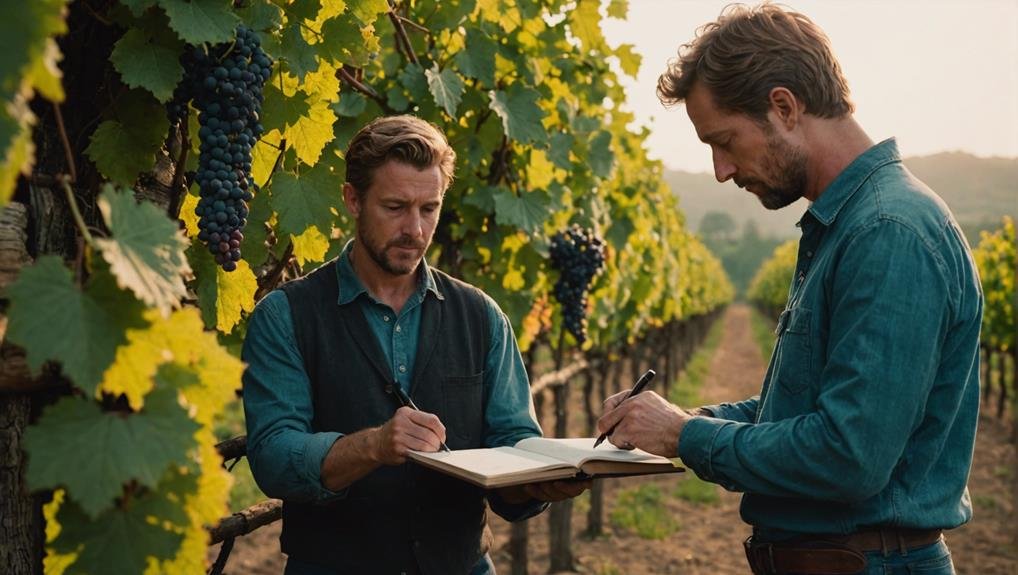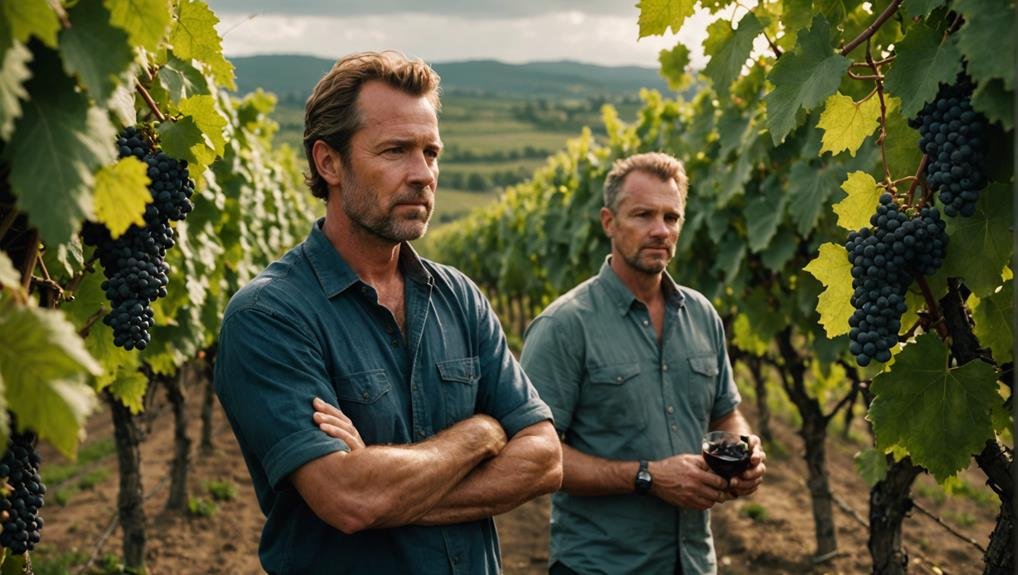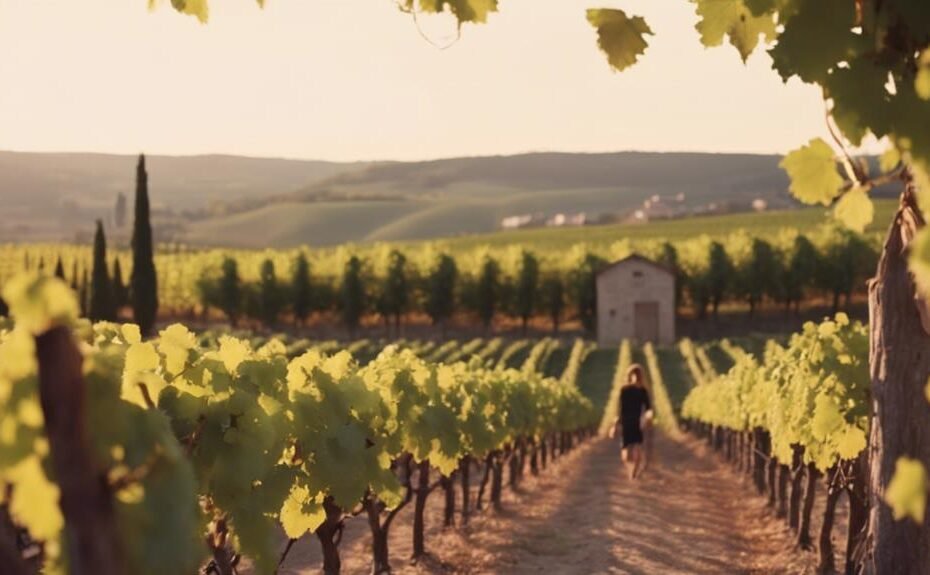Our journey to winemaking excellence starts with developing key skills like patience, multitasking, and creativity. Both hands-on training and formal education play a vital role here, blending practical techniques with theoretical understanding. Advancing in this career demands dedication, effective networking, and a commitment to ongoing learning. These elements enable us to navigate the industry efficiently.
Building strong mentorships and using industry connections can speed up growth and open new opportunities. Being adaptable and proactive helps us tackle challenges like climate changes and shifting market demands. By mastering these aspects, we lay a strong foundation for success.
Let's delve into how these factors come together to shape an impressive winemaking career.
For instance, taking courses in viticulture and enology, and seeking internships at reputable wineries can provide valuable experience. Additionally, joining professional wine associations can offer networking opportunities and keep you updated on industry trends.
By combining education, practical experience, and networking, we create a pathway to excel in winemaking.
Essential Skills for Winemakers
Patience, multitasking, and self-examination are crucial for a successful winemaking career. These skills help us manage the many aspects of winemaking effectively.
Practical training is also vital; it helps us master the precise techniques needed to craft high-quality wines. Additionally, our creativity allows us to try new ideas and create unique blends that stand out.
Problem-solving is another essential skill. Each season presents challenges, such as unexpected weather or equipment issues. Our ability to use precise techniques and think quickly helps us handle these problems.
Importance of Education and Experience
Prioritizing hands-on experience over formal education, we understand that mastering the art of winemaking requires a solid grasp of math, chemistry, and viticulture. Practical skills come from hands-on learning, while formal education builds our theoretical knowledge. Both are crucial for achieving excellence in winemaking.
Here's why education and experience matter:
- Hands-on learning:
Working directly in vineyards and cellars sharpens our practical skills. For instance, knowing how to handle grape harvests and fermentation processes is essential.
- Formal education:
Studying viticulture, chemistry, and math helps us understand the science behind winemaking. These courses give us the knowledge to solve complex problems, like managing soil health or balancing acidity in wine.
- Global exposure:
Learning from different cultures and practices expands our perspective. For example, techniques from French winemakers can teach us new ways to improve our own processes.
- Skill refinement:
Combining practical experience with formal education allows us to develop a unique winemaking style. This blend helps us create wines that stand out in the market.
Both education and experience are vital in our journey to winemaking excellence. They complement each other, making us better winemakers.
Navigating Career Development

Advancing in a winemaking career takes dedication, smart networking, and a commitment to learning. It's crucial to actively look for opportunities to improve your skills and expand your knowledge.
Networking is key—attend industry events and join professional associations to connect with peers and industry leaders. These connections can lead to job openings and provide insights into new trends.
Keeping a positive attitude and being open to feedback helps you grow professionally. Volunteering for tough projects and showing your dedication can make you stand out. Remember, your career in winemaking is shaped by the relationships you build and the experiences you embrace.
For example, joining associations like the American Society for Enology and Viticulture (ASEV) can provide access to a wealth of resources and networking opportunities. Attending events like the Unified Wine & Grape Symposium allows you to meet industry leaders and stay updated on the latest trends and technologies in winemaking.
Mentorship and Industry Connections
Building strong mentorships and industry connections is crucial for accelerating your growth and establishing a solid reputation in the winemaking field. Here's how you can make the most out of these relationships:
- Networking Opportunities: Attend industry events like wine festivals, tastings, and seminars. Joining professional associations such as the American Wine Society can help you meet influential figures in the industry. These events are great places to introduce yourself and start conversations that could lead to valuable connections.
- Mentorship Benefits: Having a mentor is invaluable. They offer feedback based on their experiences, helping you avoid common mistakes. For example, a mentor can guide you on the best practices for aging wine or navigating the complexities of vineyard management. Their insights can save you time and resources.
- Industry Insights: By engaging with experienced professionals, you gain a deeper understanding of market trends and consumer preferences. For instance, a seasoned winemaker might share trends indicating a growing demand for organic wines, allowing you to adapt your practices accordingly.
- Career Growth: Leveraging these connections can open doors to job opportunities and collaborations that propel your career. For example, a connection made at a wine expo might lead to a partnership with a renowned vineyard or a job offer from a prestigious winery.
Overcoming Challenges in Winemaking

Overcoming the challenges in winemaking requires adaptability and a proactive mindset. We understand that dealing with climate changes is crucial. Unpredictable weather can affect grape quality, so we keep a close eye on conditions and make necessary adjustments to ensure the best harvest.
Meeting customer expectations is another key focus. Customers have different tastes and preferences, so we stay updated on market trends and maintain open communication. This helps us stay flexible and ready to change our strategies to keep customers happy.
Our success depends on our ability to handle these challenges with skill and foresight. Each bottle should reflect our commitment to quality and excellence. By staying adaptable, we continue to thrive in the ever-changing world of winemaking.
Conclusion
On our journey to making great wine, we rely on hands-on experience, patience, and guidance from mentors. While some believe formal education is crucial, we've found that persistence and curiosity often bring deeper understanding. By building strong industry connections and learning from various cultures and challenges, we improve our craft. This path isn't easy, but with integrity and determination, we tackle the complexities of winemaking, ensuring our unique style stands out.
For example, we've learned valuable techniques from Italian winemakers, like the importance of soil composition in vineyards. Visiting French wineries taught us the significance of barrel aging, which enhances the flavors and aromas of our wine. These experiences help us create wines that reflect both tradition and innovation.
Our signature wines, such as our robust Cabernet Sauvignon and our elegant Chardonnay, showcase the results of our dedication. Each bottle tells a story of our commitment to quality and our passion for winemaking.
